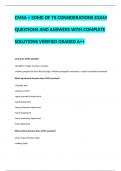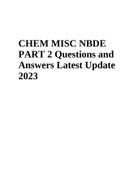Exam (elaborations)
CMSA + SOME OF TX CONSIDERATIONS EXAM QUESTIONS AND ANSWERS WITH COMPLETE SOLUTIONS VERIFIED GRADED A++
- Course
- Institution
CMSA + SOME OF TX CONSIDERATIONS EXAM QUESTIONS AND ANSWERS WITH COMPLETE SOLUTIONS VERIFIED GRADED A++ what does CMSA identify? -identifies 7 stages of motor recovery -outlines progressive from flaccid stage> reflexive synergistic movement > active controlled movement What impairment d...
[Show more]




